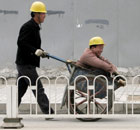Economy
Scholar warns of radical urbanization in China
(Xinhua)
Updated: 2010-03-20 09:53
 |
Large Medium Small |
BEIJING: A Chinese scholar warned radical urbanization might harm farmers' welfare and create "urban slums."
Prof. He Xuefeng, a sociologist with Huazhong University of Science and Technology based in central Hubei Province, told Xinhua that, if the country's urbanization moves too fast, the cities might not be ready to provide proper public service for newcomers, who have lost their farm lands at hometown.
"In this scenario, these newcomers in town will be driven into urban slums. We have seen lots of such examples in some developing countries," He said.
China now has about 900 million rural residents and about 145 million of them have left their hometowns to work in cities.
The country has adopted a system of residence permits, or "hukou" in Chinese, which divides its citizens into two groups, since 1958. It is not easy to change a rural hukou to an urban one.
Urban residents generally enjoy better health, medical care and education service than rural counterparts but rural people have land for farming and housing, which city people can not have.
Although the system has long been blamed for widening the gap between cities and the countryside, He pointed out its positive impacts on farmers' life.
"If rural residents do not find a good job and can not afford the expensive life in cities, they can still go back home for farming. There is enough room for them to turn around," he said.
Today, many rural families live on both wages in cities and incomes from farmland -- young people work in cities to earn wages and the older generation stay at home to work on farms.
Rural residents now enjoy somewhat "free" choice between their rural hometowns and cities, He said.
He doubted the feasibility of radical proposals by encouraging more farmers to settle in cities and transfer their land to economic entities for industrial projects or to other farmers.
"Whether rural residents will become city dwellers depends on whether they can get a decent life in cities or not," he said.
The major barrier to keep farmers away from cities is money rather than hukou, he said.
As the country's economy is still driven by manufacturing based on cheap labor cost, many rural people work as wage earners at factories and by no means can afford a decent life in cities, he said.
Under such circumstance, if the country encourages farmers to move into cities but fail to provide them proper service, it will widen the gap within cities, he said.
"And, even worse, if they lose their land, these families will have no other choice but become urban poor," he said. "This is as bad as a widening gap between urban and rural areas."
The urban-rural gap in China can not be solved simply by canceling Hukou system but through economic transformation and more efforts to improve public service in both cities and the countryside, he said.
He suggested that the country should push urbanization step by step, taking full account of farmers' real interests.







